OAKLAND — It took an afternoon on the water with a friend for Tyler Williams to realize just how far his bass fishing skills had come between picking up a rod at age 13 and becoming a two-time state champion at age 17.
“I’ll take people out who are new to it and be like, ‘Do you feel the piece of gravel, do you feel the rock (touching the line)?'” Williams said in an interview. “They’ll say, ‘What?’ And I’m like, ‘The gravel and the rock, and do you feel the weeds right next to them?’ (They’ll say,) ‘How do you tell!'”
But being able to distinguish the subtleties of what’s around his underwater lure and line is part of what has made the Belgrade teenager so successful at the sport — and what could one day carry him to the professional level.
In the last two years, Williams has had an explosive run. He was the only Mainer to be nominated to the 62-person Bassmaster High School All-State Fishing Team in March 2019. And just last month, his 8th-place finish in the adult Maine State Fish Off on China Lake — open to ages 16 and up — earned him a spot on the 2020 Maine B.A.S.S. Nation State Team.
Two months after placing 10th out of 301 teams in the 2019 Bassmaster High School Championship in Tennessee, Williams has already qualified for the 2020 national competition. He will compete, for the second year in a row, with teammate Colby Carrier, 15, of Skowhegan, next summer.
“It’s hard to predict the future, but if someone has the potential to actually (go pro), Tyler’s probably got as good a shot as anyone I’ve seen from Maine in quite some time now,” said David Trask, the youth director for Maine B.A.S.S. Nation, an offshoot of the national organization. “He’s got the dedication, he’s really determined, his skills speak for themselves, he’s really successful already at a young age. If he sticks with it, I think he’s definitely going to make it.”

Tyler Williams, a high school senior from Belgrade, steers his boat Monday while fishing for bass at East Pond. Williams, 17, won Maine’s high school bass fishing championship for the second consecutive year on Sept. 29. Morning Sentinel photo by Rich Abrahamson
Williams is a senior at the Maine Academy for Natural Sciences, which is a public charter high school on the campus of Good Will-Hinckley in Fairfield focused on careers in farming, forestry, sustainability, alternative energy and related fields.
He is deciding whether to accept a partial scholarship to compete on the collegiate level at Bethel University in McKenzie, Tennessee, which would make him the first in his family to attend college out of state. To make a living off his passion, though, he’ll need to continue advancing in the regional and national ranks and nail down sponsorships, which mentors such as Dave Cousins, a member of the Maine B.A.S.S. Nation State Team, have been helping him out with.
So far, he has the backing of Clark Marine in Manchester; Okuma, a Japanese rod and reel manufacturer; Under Armour Apparel and Footwear; Bass Mafia, a fishing equipment company; the Strike King Lure Co. of Collierville, Tennessee; Lowrance, a manufacturer of consumer sonar and GPS receivers and digital mapping systems headquartered in Tulsa, Oklahoma; Minn Kota, of Racine, Wisconsin, makers of trolling motors; and his parents’ Belgrade business, All Around Fence.
“I feel like I’m on the right track, but there are a few things I need to luck out on,” he said.
COMPETITIVE BASS FISHING
While fishing for leisure has long been a Maine tradition, competitive bass fishing has grown in popularity in the state over the last two decades, according to Trask.
“We have probably some of the best bass waters in the country,” said Trask, 56, of Skowhegan. “We have bass waters as far north as Millinocket area down to the southern part of the state and everywhere in between. You don’t have to go far to find waters where you can get bass here.”
Organizations such as the Somerset Bassmasters Club, through which Trask and Williams compete at the adult level, started forming in the 1990s, Trask said. Junior level and high school programs emerged in Maine in 2008, and the first college division formed in 2017, according to the Maine B.A.S.S. Nation website.
Tournaments in the nontraditional sport typically involve eight hours on the water. High-schoolers fish in pairs and must recruit an adult boat captain. At the end of the competition, each team’s five biggest fish are then weighed and added into a score. In some cases, the weight of the single largest fish, called a lunker, can be factored in, Williams said.
“I think (high school bass fishing) would be a lot more popular if it were more accessible,” said Trask, who coordinates youth and high school events in the state. “Generally, there are so many people who want to participate in the sport, but we have to find people with boats to be able to bring the kids out, and that gets in the way. Right now, a lot of adult anglers get their kids involved and their kids’ friends. It hasn’t grown as much as we would like to see, but it’s a lot more than it used to be, so it’s getting better.”

Tyler Williams, a high school senior from Belgrade, fishes for bass Monday at East Pond. Morning Sentinel photo by Rich Abrahamson
Gorham High School, Belfast Area High School, Biddeford High School, Cony High School, Erskine Academy, Bangor High School, Bonny Eagle High School and Hampden Academy have created bass fishing clubs in the last three years, according to the Maine High School Bassmasters website. Trask said that there are “a couple of dozen” students who participate through a statewide team because their schools do not have a formal group, though that figure fluctuates year-to-year.
Across all age levels, competitive fishing is much bigger in the southern United States, where warmer weather accommodates year-round activity. Trask said the industry’s southern nexus is part of the reason Mainers have historically struggled to hold their ground in national competitions.
“Generally speaking, championships are held in the middle to the south of our country, and Maine generally doesn’t do that well in those waters because we’re not used to them,” Trask said. “It definitely gives us a disadvantage. Anglers can do well from time to time, but mostly we don’t because everything is far away.”
A GREAT CATCH
At the 2019 high school national championship in Paris, Tennessee, Williams’ team was the only New England team to place in the top 10.
“It was really hard,” Williams said. “A lot more people fish down there. You can’t mess anything up.”
But Trask said Maine could see the competitive bass fishing industry grow as southern waters become increasingly over-fished. “Bass are an underdeveloped resource here,” he said.
Several televised Major League Fishing events aired on CBS and the Outdoor Channel since 2014 have brought national attention to central Maine and the Belgrade Lakes region.
“As more people discover, ‘Hey, there’s bass in my backyard, I can do what they do on TV,’ the bigger it’s gonna get,” Trask said.
For Williams, working toward television-level prominence involves spending up to 12 hours a day, six days a week outdoors honing his craft. Success, he said, comes down to “a little bit of luck and a lot of time on the water.”

Tyler Williams, a high school senior from Belgrade, fishes for bass Monday at East Pond. Morning Sentinel photo by Rich Abrahamson
But there’s a science to it, too. Radar and mapping technology have changed the game, allowing anglers to analyze the water and visualize the conditions where fish are likely to congregate. Williams knows to look out for thick, live weeds and algae — food sources for the small fish bass prey on. Water temperature, pressure systems and storms all affect bass behavior.
“There’s always a pattern to figure out,” Williams said. “My favorite part of fishing is not really catching them; it’s figuring out, ‘What do they want today?’”
While Williams said Three Mile Pond in Vassalboro and China Lake in China have the biggest fish in the area, East Pond in Oakland and Smithfield is one of his favorite to cast into.
“It’s just so fun,” he said of the 1,717-acre pond as he stood atop it on his Skeeter ZX225 boat on a recent afternoon. “You can catch a lot.”
In less than 25 minutes, Williams caught-and-released two largemouth bass, roughly 2.5 pounds each.
“Alright, one more cast,” he said with a casual flick of his pole as he prepared to head back to shore. It didn’t take long before his next words: “Got one!”
After reeling the bass in and letting it go again, his eyes glinted as he revealed a superstition: “I tell myself if on my last cast, I get one, I get one more (cast),” he said. “I just want to make sure I caught them all.”
Send questions/comments to the editors.

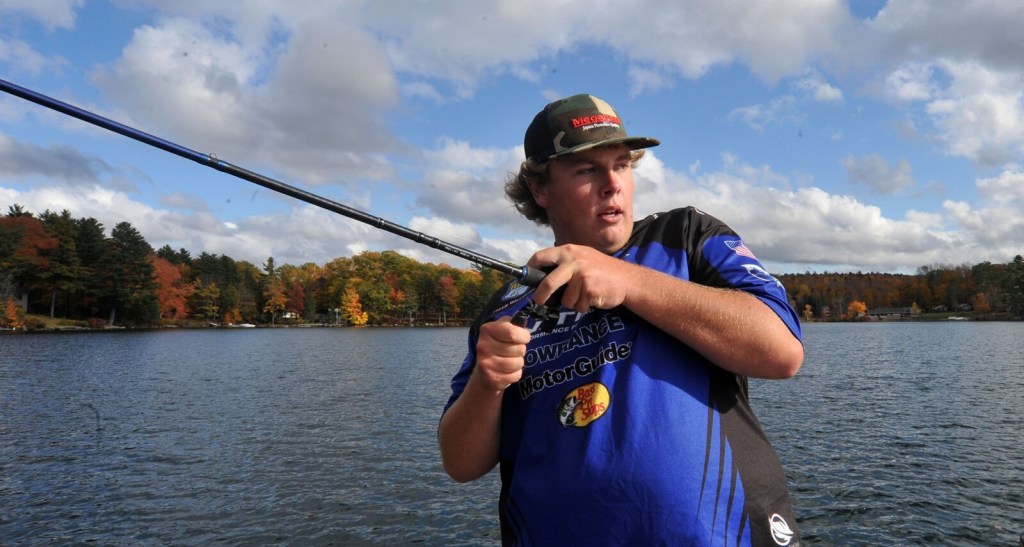
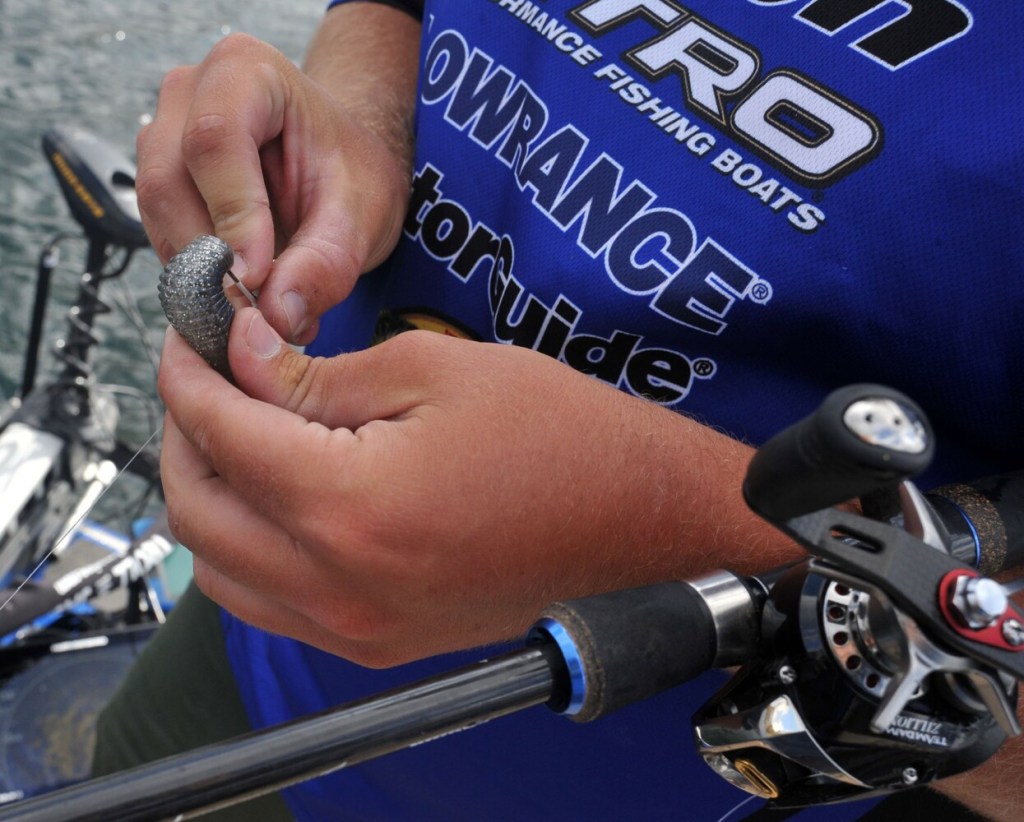
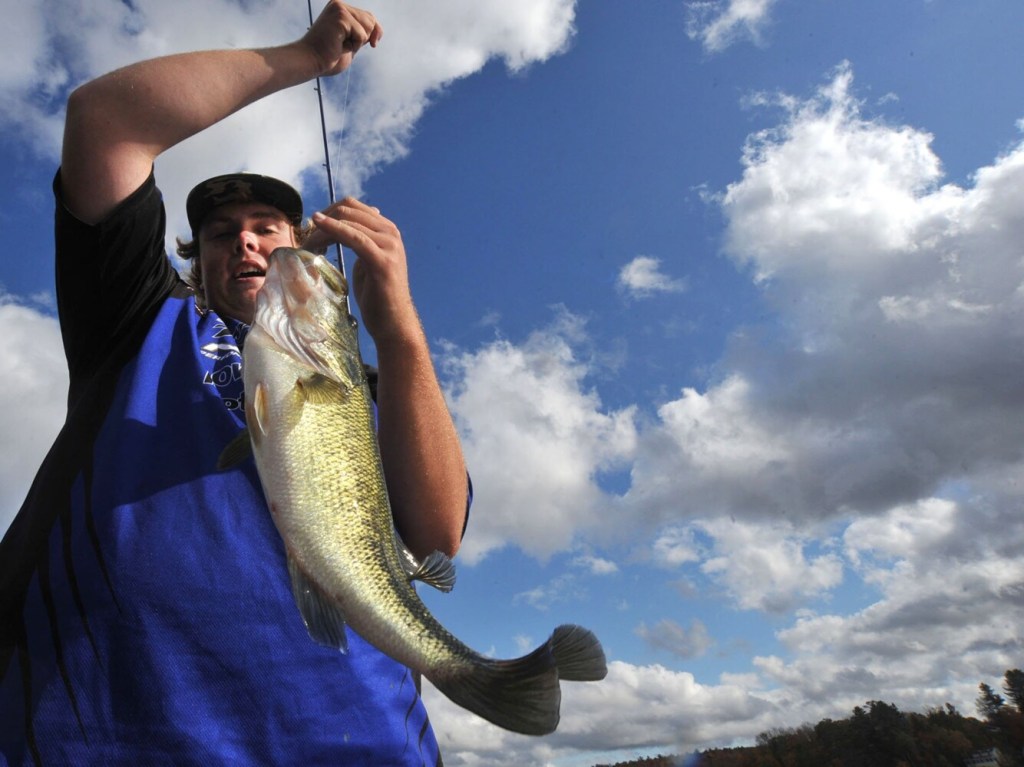
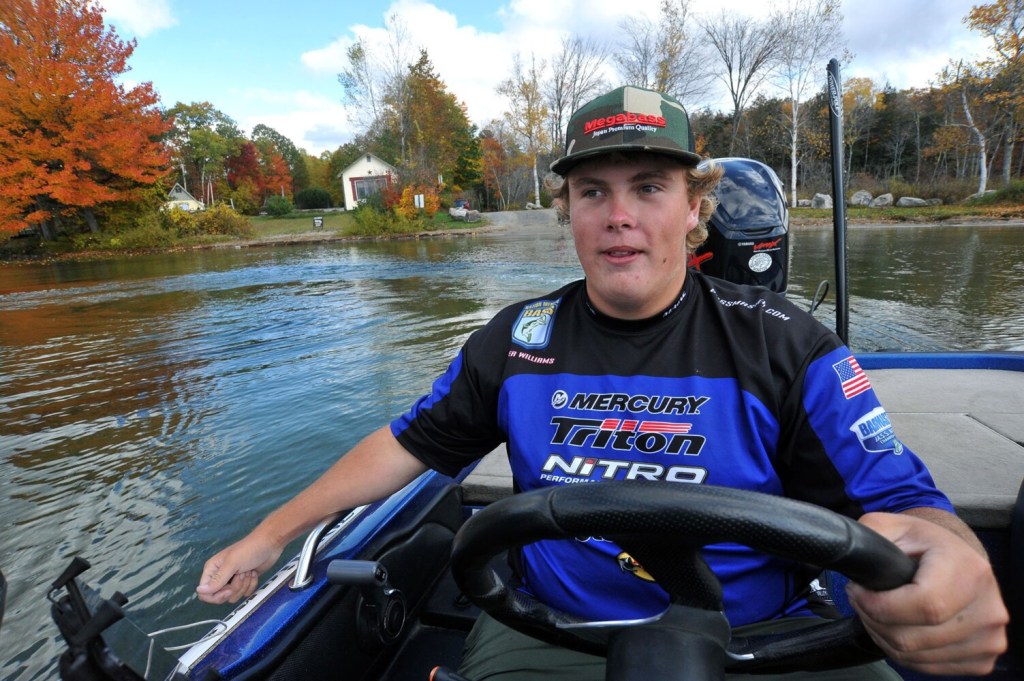
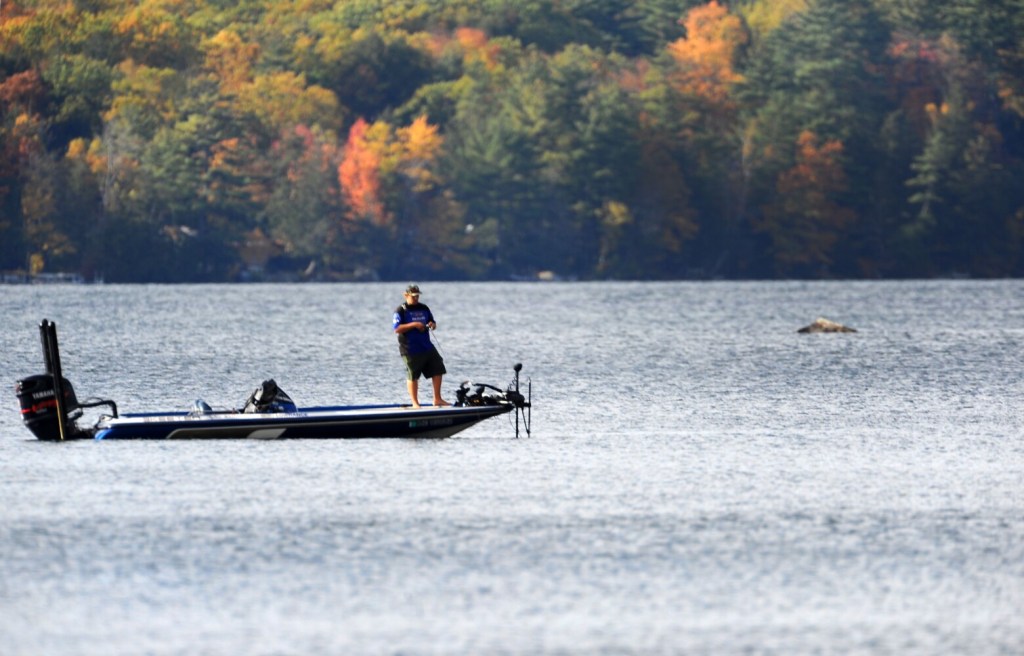

Comments are no longer available on this story